Related Research Articles

Jean-Bertrand Aristide is a Haitian former Salesian priest and politician who became Haiti's first democratically elected president. As a priest, he taught liberation theology and, as a president, he attempted to normalize Afro-Creole culture, including Vodou religion, in Haiti. Aristide was appointed to a parish in Port-au-Prince in 1982 after completing his studies to become a priest. He became a focal point for the pro-democracy movement, first under Jean-Claude "Baby Doc" Duvalier and then under the military transition regime which followed. He won the 1990–91 Haitian general election with 67% of the vote.

The government of Haiti is a semi-presidential republic, a multi-party system wherein the President of Haiti is head of state elected directly by popular elections. The Prime Minister acts as head of government and is appointed by the President, chosen from the majority party in the National Assembly. Executive power is exercised by the President and Prime Minister who together constitute the government. Legislative power is vested in both the government and the two chambers of the National Assembly of Haiti. The government is organized unitarily, thus the central government delegates powers to the departments without a constitutional need for consent. The current structure of Haiti's political system was set forth in the Constitution of March 29, 1987.
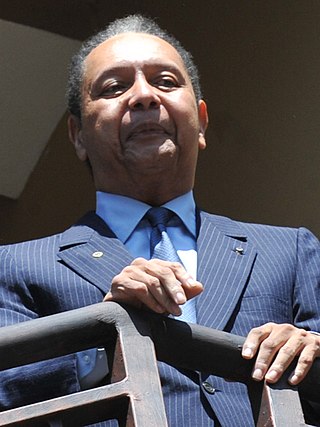
Jean-Claude Duvalier, nicknamed "Baby Doc", was a Haitian politician who was the President of Haiti from 1971 until he was overthrown by a popular uprising in February 1986. He succeeded his father François "Papa Doc" Duvalier as the ruler of Haiti after his death in 1971. After assuming power, he introduced cosmetic changes to his father's regime and delegated much authority to his advisors. Thousands of Haitians were killed or tortured, and hundreds of thousands fled the country during his presidency. He maintained a notoriously lavish lifestyle while poverty among his people remained the most widespread of any country in the Western Hemisphere.

Alexandre Sabès Pétion was the first president of the Republic of Haiti from 1807 until his death in 1818. One of Haiti's founding fathers, Pétion belonged to the revolutionary quartet that also includes Toussaint Louverture, Jean-Jacques Dessalines, and his later rival Henri Christophe. Regarded as an excellent artilleryman in his early adulthood, Pétion would distinguish himself as an esteemed military commander with experience leading both French and Haitian troops. The 1802 coalition formed by him and Dessalines against French forces led by Charles Leclerc would prove to be a watershed moment in the decade-long conflict, eventually culminating in the decisive Haitian victory at the Battle of Vertières in 1803.
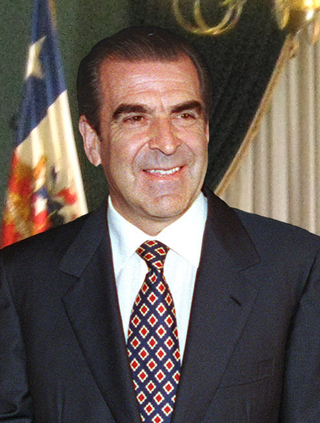
Eduardo Alfredo Juan Bernardo Frei Ruiz–Tagle is a Chilean politician and civil engineer who served as president of Chile from 1994 to 2000. He was also a Senator, fulfilling the role of President of the Senate from 2006 to 2008. He attempted a comeback as the candidate of the ruling Concertación coalition for the 2009 presidential election, but was narrowly defeated. His father was Eduardo Frei Montalva, president of Chile from 1964 to 1970.
Joseph Raoul Cédras is a Haitian former military officer who was the de facto ruler of Haiti from 1991 to 1994. Cedras was the last military ruler of Haiti.

Warren Minor Christopher was an American attorney, diplomat and statesman who served as the 63rd United States secretary of state from 1993 to 1997.
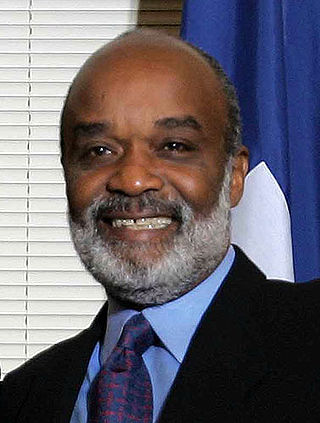
René Garcia Préval was a Haitian politician and agronomist who twice was President of Haiti, from early 1996 to early 2001, and again from mid-2006 to mid-2011. He was also Prime Minister from early to late 1991 under the presidency of Jean-Bertrand Aristide.
Louis-Jodel Chamblain is a prominent Haitian military figure who has led both government troops and rebels.

Operation Uphold Democracy was a multinational military intervention designed to remove the military regime led and installed by Raoul Cédras after the 1991 Haitian coup d'état overthrew the elected President Jean-Bertrand Aristide. The operation was effectively authorized by the 31 July 1994 United Nations Security Council Resolution 940.
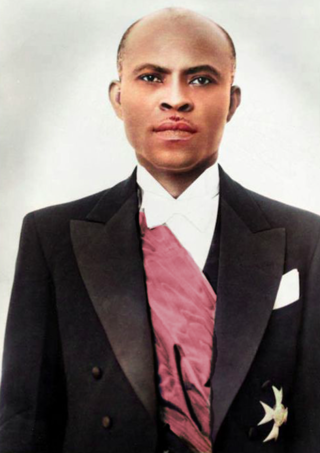
Dumarsais Estimé was a Haitian politician and President of the Haitian Republic from August 16, 1946, to May 10, 1950.

Dimitris Avramopoulos is a Greek politician of the conservative New Democracy party, and former career diplomat. He has served in various high-level cabinet posts, including Minister for Foreign Affairs and Minister for National Defence, and was Mayor of Athens from 1995 to 2002. He served as EU Commissioner for Migration, Home Affairs and Citizenship in the Juncker Commission between 2014 and 2019.
Jean-Claude Bajeux was a Haitian political activist and professor of Caribbean literature. For many years he was director of the Ecumenical Center for Human Rights based in Haiti's capital, Port-au-Prince, and a leader of the National Congress of Democratic Movements, a moderate socialist political party also known as KONAKOM. He was Minister of Culture during Jean-Bertrand Aristide's first term as President of Haiti.
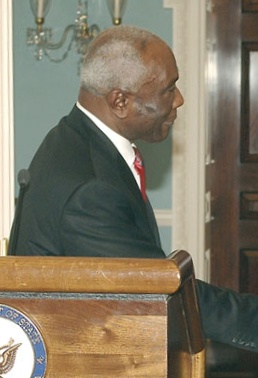
Jacques-Édouard Alexis is a Haitian politician. He served as the prime minister of Haiti from 1999 to 2001 and was prime minister for a second term from 2006 to 2008 when he was dismissed due to political fallout from food riots.
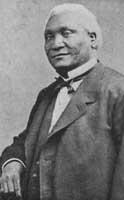
Louis Étienne Félicité Lysius Salomon was the president of Haiti from 1879 to 1888. Salomon is best remembered for instituting Haiti's first postal system and for his lively enthusiasm for Haiti's modernization.
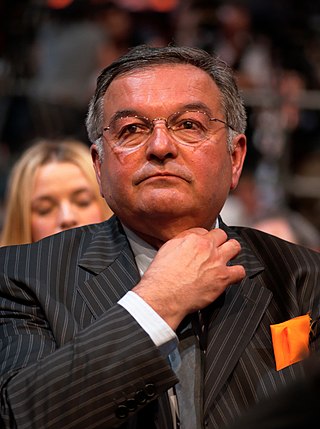
Michel Mercier is a French politician and who served as Minister of Justice from 2010 until 2012.

The 1991 Haitian coup d'état took place on 29 September 1991, when President Jean-Bertrand Aristide, elected eight months earlier in the 1990–91 Haitian general election, was deposed by the Armed Forces of Haiti. Haitian military officers, primarily Army General Raoul Cédras, Army Chief of Staff Philippe Biamby and Chief of the National Police, Michel François led the coup. Aristide was sent into exile, his life only saved by the intervention of U.S., French, and Venezuelan diplomats. Aristide would later return to power in 1994.

The Socialist Party is a centre-left to left-wing political party in France. It holds social democratic and pro-European views. The PS was for decades the largest party of the "French Left" and used to be one of the two major political parties under the Fifth Republic, along with the Rally for the Republic in the late 20th century, and with the Union for a Popular Movement in the early 2000s. It replaced the earlier French Section of the Workers' International (SFIO) in 1969 and is currently led by First Secretary Olivier Faure. The PS is a member of the Party of European Socialists, Progressive Alliance and Socialist International.
Three pro-democracy Haitian radio journalists were assassinated in Little Haiti, Miami, Florida, United States between 1991 and 1993.
The 45th Legislature of the Haitian Parliament was in office from 4 February 1991 to 4 February 1995.
References
- 1 2 Stotzky, Irwin P. (15 June 1999). "Silencing the Guns in Haiti: The Promise of Deliberative Democracy". University of Chicago Press.
- 1 2 "6300.- Notables et personnalités d'Haiti » Fichier: 13". www.haiti-reference.info.
- ↑ "WHY WE'RE NOT HAITIAN 'PUTSCHISTS'". Washington Post. 5 January 2024.
- ↑ Staff, Oas (1 January 1998). "Anuario Interamericano de Derechos Humanos" (in Spanish). Martinus Nijhoff Publishers.